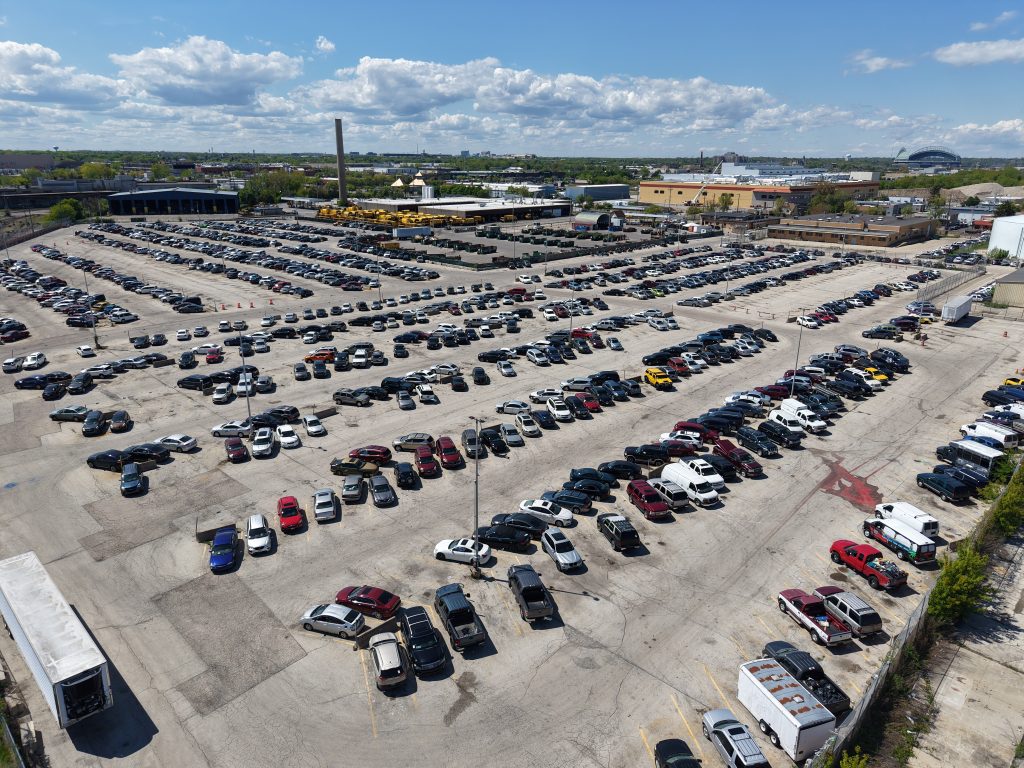Milwaukee Changing How It Deals With Habitual Parking Offenders
Those with five or more tickets will receive new treatment from the city.
The City of Milwaukee has a new policy for handling drivers with five or more unpaid parking tickets.
The change was spurred by an early 2025 report that revealed more than $41 million had accumulated in unpaid parking citations over the past seven years. More than $16.1 million of that debt was owed by the approximately 39,000 “habitual parking violators” who have more than five outstanding tickets.
“We wanted to look at it and say ‘can we build this mousetrap better? Can we do this in a way that’s transparent and accountable?'” Jim Bohl, the city’s director of innovation, said to the Public Safety & Health Committee on July 24.
The prior city policy started with an automatic, unannounced tow if a vehicle was found parked illegally and the associated license plate had five or more tickets unpaid and issued more than 60 days prior. It ended with a loophole, where vehicle owners could pay the towing fee and any storage costs to redeem their vehicle, but skip out on paying the outstanding citations.
Alderman Scott Spiker, citing his own son’s experience, said individuals were often unaware of the towing policy, or that they had reached habitual offender status. Instead, they might think their car got stolen.
The Department of Public Works (DPW) reported towing more than 4,000 habitual violators per year.
“I think we as a city don’t want to be towing people… but we do need a way to enforce our parking rules,” said Spiker. Working with Bohl, a “sweet spot” was found. “A much kinder, gentler way to get people to take their municipal tickets seriously than to tow their car.”
Despite opposition from some council members, the policy is due to go into effect Nov. 1.
Letters are now to be mailed to anyone who reaches habitual offender status, warning them of a possible tow. The letter, written in English and Spanish, is to include information on how to pay citations in full, enter a payment plan or request community service from a municipal judge. Habitual violator tows may only occur 60 days after a letter is sent to an individual.
The redemption loophole is also being modified. Redeeming a vehicle from a habitual-tow violation will require the vehicle owner to either pay all of the citations in full immediately or schedule a virtual or in-person municipal court appearance.
As long as an individual complies with the terms set by a municipal judge, which could include a $20 per month payment plan or community service, they won’t be subject to additional habitual violator tows. However, failure to appear or failing to comply with the terms will cause a new penalty to go into effect.
Those out of compliance with a court-ordered plan will be subject to tows even if parked legally.
“Our goal here is not to tow vehicles,” said interim parking services manager and long-time tow lot manager Peter Knox on July 24. He said he believed all of the changes would reduce the total number of tows. “Our goal is compliance.”
The current policy already has fairly strong compliance, but at a high cost for an individual of needing to pay to redeem a vehicle after a surprise tow. Only 13% of those towed under the habitual offender ordinance are repeat tows.
Equity concerns split council
There is far from universal agreement on the policy on the Common Council, or even within the administration.
Then-Chief Equity Officer Bernadette Karanja asked the public safety committee on July 24 to delay the proposal, though she agreed accountability for individuals was merited. She asked for a “grace period of 10 to 12 months” to allow DPW to collect demographic data, including on race, income and gender, of those who are towed.
Bohl and Spiker said that waiting would only leave the current regime in effect. Bohl suggested the better test was to see the impact of the new policy. “We believe we can walk and chew gum,” he said.
Alderwoman Marina Dimitrijevic, who requested Karanja’s analysis, championed a delay.
“A habitual parking offender is also a constituent,” she told the council on July 31. “I’ve been told that this item before us can’t fix the whole system, but we can pause the change to the system, talk about, recalibrate and maybe question it.”
She said a new DPW report, released after the committee hearing, showed that there were 20,500 active habitual violators and that their ZIP code of residence was disproportionately aligned with the city’s lowest income ZIP codes. The total debt associated with active violators is $8.7 million. At least 12% of active violators live outside of the city.
“We’re punishing people particularly those that already can’t afford it,” said Ald. Sharlen P. Moore.
“I think there needs to be a notice period of one year if we’re going to do this,” Ald. Lamont Westmoreland. He cited concerns with notifying people who do not have a permanent address.
“The whole motivation is not to send friendly letters to our constituents, it’s to send threatening letters to squeeze out the overdue, uncollected debt,” said Dimitrijevic.
But her pitch didn’t sway enough of her colleagues.
“I think the sponsor was trying to make the process more fair, more equitable,” said Ald. Robert Bauman. He said not passing it wouldn’t stop towing.
“This to me is better because you get a chance not to get your car towed,” said Ald. Russell W. Stamper, II.
A proposal to send it back to committee got only six of the necessary eight votes: Dimitrijevic, Moore, Alex Brower, Milele A. Coggs, JoCasta Zamarripa and José G. Pérez.
Faced with likely passage, Dimitrijevic received unanimous support for an amendment to delay implementation until Nov. 1.
The council then, with one abstention, passed the policy change.
Coggs withheld her vote because a fiscal note was not prepared estimating the financial impact of the ordinance. Spiker said DPW informed him it would cost $30,000 to mail the first round of letters, but that he wasn’t sure whether revenue would increase or decrease if more payment plans were started and fewer tows occurred.
“My greatest hope is that the number of tows will go down… and the number of people on a payment plan will go up,” said Spiker.
Legislation Link - Urban Milwaukee members see direct links to legislation mentioned in this article. Join today
If you think stories like this are important, become a member of Urban Milwaukee and help support real, independent journalism. Plus you get some cool added benefits.
Political Contributions Tracker
Displaying political contributions between people mentioned in this story. Learn more.
- May 17, 2018 - José G. Pérez received $50 from Bernadette Karanja
- May 5, 2015 - José G. Pérez received $100 from JoCasta Zamarripa
City Hall
-
Hidden Tubes Will Net City $500,000 Annually
 Oct 10th, 2025 by Jeramey Jannene
Oct 10th, 2025 by Jeramey Jannene
-
Future of Sunday Library Hours Uncertain As MPL Tries New Staffing Model
 Oct 9th, 2025 by Jeramey Jannene
Oct 9th, 2025 by Jeramey Jannene
-
Council Might Pump Brakes on Mayor’s Proposed Wheel Tax Increase
 Oct 6th, 2025 by Jeramey Jannene
Oct 6th, 2025 by Jeramey Jannene























For the vehicles of habitual offenders that are found parked on the street, why not put on a wheel lock that some
For the vehicles of habitual offenders that are found parked on the street, why not put on a wheel lock that some cities use. The owner’s car would not have to be towed. The owner could pay the fines at the local precinct and pay a fee for a parking checking to come by and unlock the collar. It would be cheaper than a tow for the vehicle owner and simplify the process for getting them back on the road.